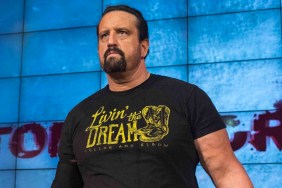Hello everybody, and welcome to another edition of Reading Between The Ropes. Thereâ<80><99>s one thing thatâ<80><99>s inevitable about any wrestling career. No matter how good, bad, average or legendary a career may be, we can always be assured that at some point it will have to come to an end. Whether a wrestler tries to resist it, deny it, or delay it, that inevitable time will come when they must hang up their boots.
This decision can, of course, be taken out of a wrestlerâ<80><99>s hands, and in the most tragic of cases, it isnâ<80><99>t just a wrestlerâ<80><99>s career that can end suddenly. But, when it comes to the pre-advertised, premeditated and marquee-touted ‘final’ match of a wrestler, thereâ<80><99>s an old adage that itâ<80><99>s best to go out on your back.
Why?
Well, the most obvious answer is that in a final match a legendary wrestler would face an up-and-coming star who has what it takes to be a legend, but may not be there just yet. In this case they could do with gaining the â<80>~rubâ<80><99> from the legend, and defeating him would create a â<80>~passing of the torchâ<80><99> moment.
But what if the retiring wrestler were not a legend? What good would a passing of the torch do? Would there even be a torch to pass? Well, the fact is that pre-announced â<80>~finalâ<80><99> matches on the big stage are usually only reserved for legends. Wrestlers who never make much of a mark in their career usually drift out of the big scene and in to the independent and small-time feds. In this case they could be wrestling way beyond their prime, and by the time they do retire, they were long-gone out of the public eye.
Another reason for going out on oneâ<80><99>s back may be to convince fans that now is the right time to go. By going out with a loss, it limits the possibility of fans who are suspending their disbelief being convinced that there is plenty more gas in the tank for matches and victories. By creating the illusion that there isnâ<80><99>t much more fight in the dog, so to speak, the retirement may be easier to swallow for die-hard fans of said wrestler. Of course, while I say â<80>~creating the illusion,â<80><99> the majority of the time the retirement is simply because there actually isnâ<80><99>t any fight left in the wrestler. However, in a profession of pre-determined outcomes, a victory at 21 is as easy as a victory at 81, if a booker says so, and, sometimes, no matter what state your body is in, you need the result of a match to reaffirm your reasons for retiring.
But there is another famous saying when it comes to retiring, and it goes to the tune of â<80><9c>Itâ<80><99>s better to go out on top.â<80> Itâ<80><99>s the fairy-tale way to go out. Itâ<80><99>s the way Trish Stratus went out Sunday night. Itâ<80><99>s the way many say Hulk Hogan should go out someday. Going out with a victory gives many nostalgic fans the feel good factor. No one can deny that it would have been rather odd to see Lita defeat Trish in her final match last night, and, by giving Trish the win, it gave her the storybook ending her career deserved.
So, arenâ<80><99>t these two famous saying rather contradictory? Itâ<80><99>s best to go out on your back, but better to go out on top? Perhaps the statement is less oxymoronic when looked at a little deeper. In the predetermined world of wrestling victories are important, but they are not everything. Take a look at the legends of the business and you will see that they have all suffered many losses in their time. However, their greatness isnâ<80><99>t simply measured on wins and losses like in â<80>~legitimateâ<80><99> sports. No, in wrestling points for style, grace and performance count for a lot more.
Sure, countless loss after countless loss hurts a wrestlerâ<80><99>s ability to get over with fans. As I said in my column entitled â<80><9c>Another One In The Win Column?â<80>, wrestlers like â<80>~Ironâ<80><99> Mike Sharpe and the Brooklyn Brawler arenâ<80><99>t shifting merchandise, and nor will they receive epic send offs in their final match. However, it goes back to the original point that marquee retirement matches are for legends. By that very nature, these guys have already established a legacy for themselves with enough wins to convince fans of their superstar status. In that case, â<80><9c>itâ<80><99>s better to go out on topâ<80> is still applicable in the sense that the level of performance of the retiring wrestler has not deteriorated significantly, and that he is still close enough to the top of his game. Chris Benoit lost to Kurt Angle at Royal Rumble 2003, but received a standing ovation afterwards. Had that been Benoitâ<80><99>s last match, even in defeat, he would still be going out â<80>~on top,â<80><99> so to speak.
In the documentary â<80><9c>Beyond the Matt,â<80> Barry Blaustein followed the story of Terry Funkâ<80><99>s â<80>~last match.’ In the documentary he referred to how Funk went out like all wrestlers are supposed toâ<80>¦ on their back. Funk lost to Bret Hart in that match, at Funkâ<80><99>s own request. Of course, Funk has had many â<80>~finalâ<80><99> matches in his time, and he still hasnâ<80><99>t retired today, but it seems that the saying of going out on oneâ<80><99>s back is still something that Terry Funk very much believes in.
Mick Foley lost to Triple H at No Way Out in his â<80>~finalâ<80><99> match. Since then Foley has wrestled, and won, matches. However, it seems Foley also adheres to the aforementioned adage. While we do not know when Foleyâ<80><99>s FINAL â<80>~finalâ<80><99> match will be, we can only point to his willingness to put over Randy Orton and Edge, and lose previous â<80>~finalâ<80><99> matches to HHH and at Wrestlemania 2000 as evidence that Mick would rather go out on his back than with his hand raised.
Steve Austinâ<80><99>s last official match was at Wrestlemania 19. It was a match he lost to The Rock. While the match wasnâ<80><99>t announced as Steveâ<80><99>s final match, the reaction of Austin at the close of the match showed that Steve had a fairly good idea that this would be his final match. While rumours still fly about that Austin will return to the ring, for the time being this is in the books as Austinâ<80><99>s last official match, and, yes, he went out on his back.
Sting faces Jeff Jarrett this Sunday in a career vs. title match at No Surrender. If Sting loses, he is forced to retire. Traditionally, matches with careers on the line rarely lead to final appearances by wrestlers. Randy Savageâ<80><99>s loss to Ultimate Warrior at Wrestlemania 7, Undertaker’s loss to Steve Austin at Fully Loaded with Vince McMahonâ<80><99>s career on the line, and the fifty million WCW examples in the late 90s and early turn of the millennium are fine examples. However, in this case, going out on oneâ<80><99>s back is a prerequisite for retirement. It goes hand-in-hand.
So, just how beneficial is losing your final match? Well, I guess it simply depends on the wrestler and the situation. Trish Stratus, wrestling in her hometown and to break the record number of Womenâ<80><99>s title victories, simply had to win that match. Mick Foley and Terry Funk, guys renowned not for their impressive win/loss record during their careers, but more their intestinal fortitude, are surely destined to go out on their backs. And when guys like Hulk Hogan and Ric Flair retire? Wellâ<80>¦ who knows? It could depend entirely on the environment, situation, and opponent.
One thing is for certain, though, whether going out on their backs, or with their hands raised, wrestlers will always try and go out with a bang.
Until next time,
Mitchell L. Gadd








